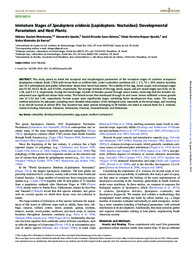Immature stages of Spodoptera eridania (Lepidoptera: noctuidae): developmental parameters and host plants.
Immature stages of Spodoptera eridania (Lepidoptera: noctuidae): developmental parameters and host plants.
Author(s): MONTEZANO, D. G.; SPECHT, A.; SOSA-GÓMEZ, D. R.; ROQUE-SPECHT, V. F.; BARROS, N. M. de
Summary: This study aimed to detail the temporal and morphological parameters of the immature stages of southern armyworm Spodoptera eridania (Stoll, 1782) with larvae feed on artificial diet, under controlled conditions (25?±?1°C, 70?±?10% relative humidity and 14-h photophase) and gather information about their larval host plants. The viability of the egg, larval, pupal, and prepupal stages was 97.82, 93.62, 96.42, and 97.03%, respectively. The average duration of the egg, larval, pupal, and pre-pupal stages was 4.00, 16.18, 1.58, and 9.17 d, respectively. During the larval stage, 43.44% of females passed through seven instars, observing that the female's development was significant slower than males. The female larvae that developed through six and seven instars exhibited a mean growth rate of 1.52 and 1.44, respectively. Female pupae were significantly larger, exhibiting faster development than males. The rearing method proved to be adequate, providing more detailed observations of the biological cycle, especially at the larval stage, and resulting in an overall survival of almost 85%. Two hundred two plant species belonging to 58 families are listed as natural hosts for S. eridania, mainly including Asteraceae, Fabaceae, Solanaceae, Poaceae, Amaranthaceae, and Malvaceae.
Publication year: 2014
Types of publication: Journal article
Unit: Embrapa Soybean
Keywords: Caterpillars, Host plants, Lagarta, Plant pests, Praga de planta
Observation
Some of Embrapa's publications are published as ePub files. To read them, use or download one of the following free software options to your computer or mobile device. Android: Google Play Books; IOS: iBooks; Windows and Linux: Calibre.
Access other publications
Access the Agricultural Research Database (BDPA) to consult Embrapa's full library collection and records.
Visit Embrapa Bookstore to purchase books and other publications sold by Embrapa.

